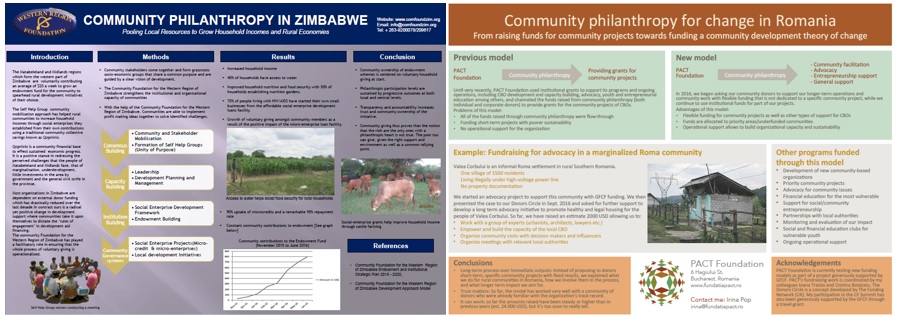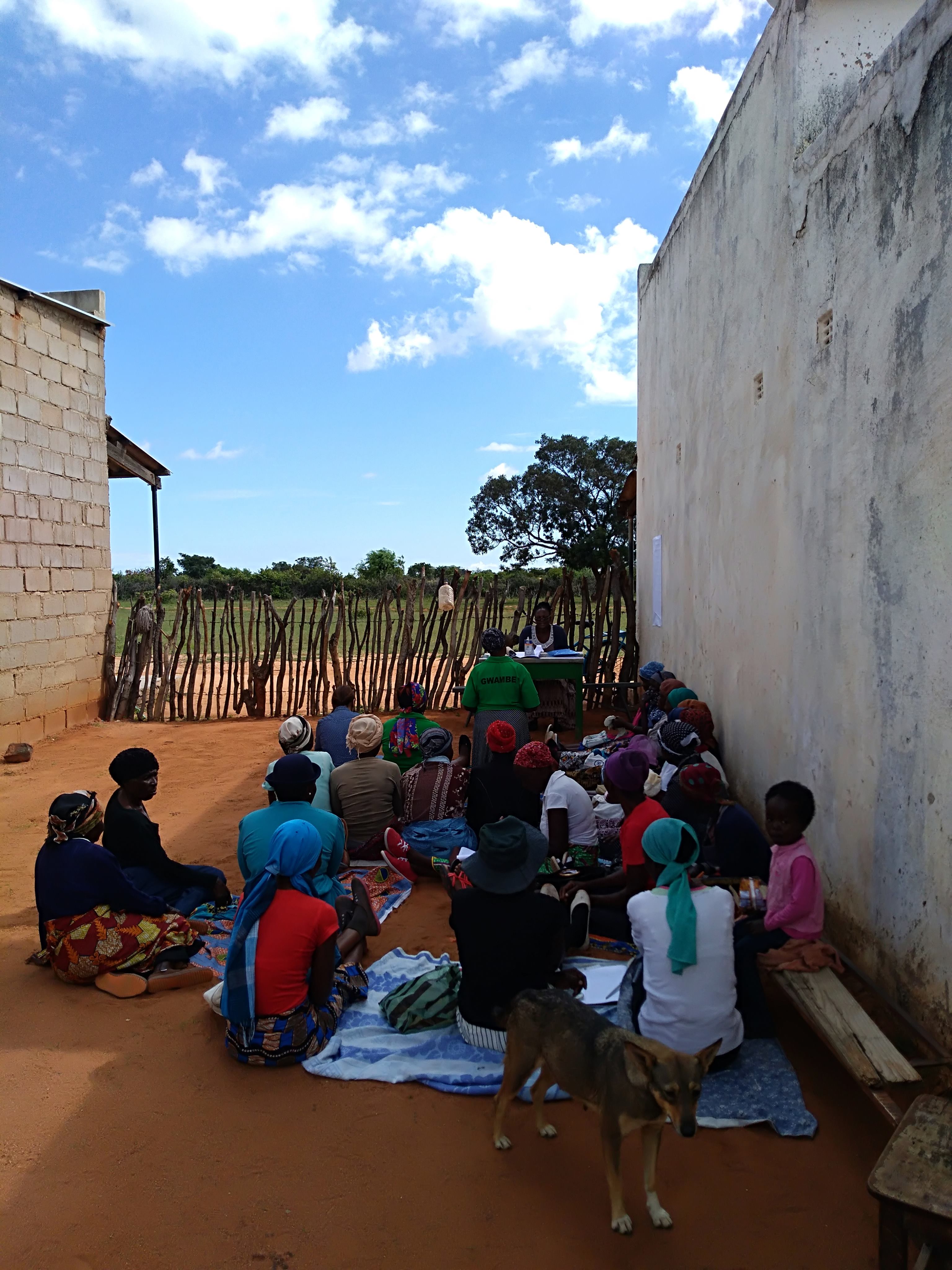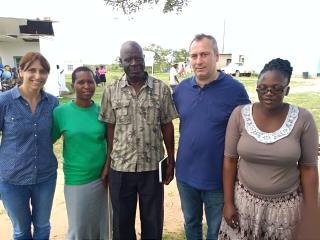It started with two posters – exploring an unlikely learning exchange between Romania and Zimbabwe
22 Feb 2019

As they are geographically separated by more than 10,000 kilometres, one may wonder how the Fundatia PACT and Community Foundation for the Western Region of Zimbabwe (CFWRZ) came into contact with each other. Given the differences in their contexts, one’s curiosity may be further piqued to learn that over 2018 the two organizations set out to better understand each other’s organizations (aims, models, approaches, etc.) by arranging a two-way learning exchange. Spanning continents, and with funding from the GFCF, two PACT staff travel to Bulawayo in March, and two months later two CFWRZ staff visited southern Romania in May. The GFCF spoke with Maria Ionescu from PACT, one of the exchange participants, to find out more about this seemingly unlikely partnership.
GFCF: Could you give us some background on how you met, and how this learning exchange came about?
Maria Ionescu (MI): In December 2016, our then Programs Director Irina Pop participated in the Global Summit on Community Philanthropyin Johannesburg, where she was presenting PACT’s work in the Poster Session. CFWRZ was also exhibiting a poster at the Summit, highlighting their work with Self Help Groups in rural areas around Bulawayo (see larger versions of the PACT and CFWRZ posters). The language CFWRZ was using to frame its principles and methods for working with communities struck a chord with Irina, as it seemed so similar to the language we use at PACT. CFWRZ’s experiences around creating economic opportunities for marginalized groups was also immediately interesting, as this was a topic that we had been discussing for some time at PACT, hoping to learn more about how this works in practice. So over the course of the Summit Irina made sure that she spoke with Mathamsanqa Moyo from CFWRZ – and the idea of the exchange was born!
GFCF: Can you be more specific about what you wanted to explore during the exchange? What did you want to get out of the experience?
 Capacity building training for a recently formed Self Help Group in Gwambe MI: The main aim of the visit for the PACT team was to learn more about the “Qogelela Approach” employed by CFWRZ in rural areas with marginalized populations. Qogelelais a traditional approach, inherent in the culture and tradition of the people in the western parts of Zimbabwe,that builds a community’s collective savings. With Qogelela, community members pool together resources with the ultimate goal of creating a permanent community endowment. The concept is grounded in the traditional principles of community mobilization for social emancipation, which are: Zihluze (examine yourself); Ziqoqe (mobilize yourself); Zimisele (commit yourself); Zenzele (do it yourself); Ziqhatshe (be self-employed); Zimele (be self-reliant); Ziqhenye (be proud of yourself); and Zithembe (trust yourself and be confident). With support from the GFCF, CFWRZ has piloted this approach in three different communities and the results have been promising.
Capacity building training for a recently formed Self Help Group in Gwambe MI: The main aim of the visit for the PACT team was to learn more about the “Qogelela Approach” employed by CFWRZ in rural areas with marginalized populations. Qogelelais a traditional approach, inherent in the culture and tradition of the people in the western parts of Zimbabwe,that builds a community’s collective savings. With Qogelela, community members pool together resources with the ultimate goal of creating a permanent community endowment. The concept is grounded in the traditional principles of community mobilization for social emancipation, which are: Zihluze (examine yourself); Ziqoqe (mobilize yourself); Zimisele (commit yourself); Zenzele (do it yourself); Ziqhatshe (be self-employed); Zimele (be self-reliant); Ziqhenye (be proud of yourself); and Zithembe (trust yourself and be confident). With support from the GFCF, CFWRZ has piloted this approach in three different communities and the results have been promising.
We were specifically interested to understand how CFWRZ was using Qogelela to mobilize rural woman into small community clusters, also called Self Help Groups. We understood that using the Qogelela approach, women who were part of these groups had managed to increase their household incomes by setting up social enterprises, established with contributions drawn from the Qogelela. CFWRZ was also doing interesting work around building the capacities of women in these groups, and we wanted to understand if we could use some or all of CFWRZ’s approaches in a Romanian context, as income generation for households in particularly marginalized communities is essential.
GFCF: What were the main similarities or differences that you encountered between the work of the two organizations?
MI: Both PACT and CFWRZ are dedicated to building sustainable communities and have community development at our core. We aim to work with similar types of communities: rural, underserved, and marginalized. Additionally, we both work with networks of collaborators (trainers, consultants and facilitators) who carry out some of our activities at the very local level. We are both also deeply committed to the empowerment of community members, which we believe is achieved through building leadership and trust.
So our two organizations share a very similar vision, though we use different approaches to reach our goals. PACT, on the one hand, uses strategies that include financial inclusion, capacity building of communities with information and tools about household budgets, savings and loans, as well as personalized assistance to families so that they may understand and use existing income more efficiently. We also achieve our mission by working in long-term partnerships with community-based organizations, and recently have placed more of an emphasis on building the capacity and sustainability of these organizations in the hopes that one day they may be 100% self-reliant and self-sustaining. CFWRZ’s approach, on the other hand and as noted above, uses the traditional Qogelela approach to mobilize and empower rural communities by building permanent endowments.
Another difference between our organizations relates to the levels of poverty in our rural communities. More than ten years of economic crisis and political instability have resulted in widespread and extreme poverty in Zimbabwe, with rural populations lacking access to basic resources (such as drinking water) and social services. The gender disparity in Zimbabwe also seemed to be more pronounced. Poverty in rural Romanian communities is mainly the result of the transition from the socialist-communist social organization to the capitalist socio-economic system. The abolition after 1989 of agricultural cooperative structures, along with the widespread disappearance of small-town industries, left large numbers of individuals in rural areas without income. However, these communities still have access to basic resources and social services (such as education and free medical care) and benefit from a minimum guaranteed income. Appreciating these different contexts should of course affect how an organization chooses to work with communities, understanding the different needs at play.

Maria, Self Help Group member, mayor of Ndiweni, Manuel (PACT) & Buhle (CFWRZ)
GFCF: What were the main takeaways from this experience for your work? What (if anything) will you change at your organization as a result of this experience?
MI: As noted above, both organizations use different approaches to fulfil the same vision. The main takeaway for me is this: know and use the local economic, social and cultural context because this has to be the foundation of your approach. It is also essential to learn from your previous work and constantly improve your methodology. Communities are unique “living organisms”, always evolving, and organizations like ours should be flexible enough to accompany them in good times and bad.
CFWRZ’s model of building community endowment funds by collecting interest from the Self Help Groups’ funds established with members’ contributions cannot be applied as such in Romania, primary due to our legislative context. This is in part because only a financial institution can collect interest from people or other institutions, but also because in Romania individuals have more access to credit and other financial services offered by banks (which makes the idea of working with loans less attractive).
However, while we cannot adopt CFWRZ’s entire methodology per se, there are definitely some elements that we want to further explore. CFWRZ’s Self Help Group model could, for example, be a great way to empower women in deprived rural communities in Romania.
Maria Ionescu is the Manager of Projects at Fundația PACT – Parteneriat pentru Acțiune Comunitară și Transformare

